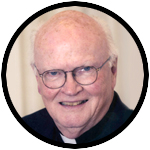
Father William Byron, S.J.
I meet once a month with a small group of business executives, both active and retired, to pray together and to discuss the relevance of religious faith to business practice. Early one morning, less than a month before the 2016 presidential election, we reflected on the letter of Paul to the Philippians 1:6-12.
I was struck by how most of the group wanted to dwell on Verses 9 and 10 of that opening chapter where Paul says, “My prayer is that your love may more and more abound, both in understanding and wealth of experience, so that with clear conscience and blameless conduct you may learn to value the things that really matter, up to the very day of Christ.”
One participant in the group pointed out that none of the things that “really matter” is in fact material, so it is curious that we use the word “matter” to underscore importance. What is of ultimate importance is always immaterial, like love and courage.
[hotblock]
But again we use the word “immaterial” to suggest that something is of no consequence — we say, in effect, that it doesn’t matter! However, “immaterial” really means spiritual.
All agreed that there has been a noticeable absence of attention to immaterial values and an embarrassing presence of commentary about unbecoming and inappropriate conduct in this presidential campaign.
What are the things that really matter to most Americans these days? What should matter? How will our deepest concerns express themselves when we close the curtain and cast our votes on Nov. 8?
Is it naive to look for virtue in candidates for the highest office in this land? We used to call that character. Through a political process that we call democracy, we are moving toward an inauguration, certainly not a canonization. So we have to be realistic as we size up the candidates.
Moreover, we have to look all the way down the ticket to the lesser-known candidates and to the ballot proposals and resolutions that will affect the ways we live our lives together.
That we show up to vote at all is testimony to our acknowledgment that we live in an imperfect world. Voting is a civic responsibility, a moral obligation. So vote we should and vote we must.
Perhaps over the years, we will improve the process by which we select candidates (shorten it, for example, to six weeks) and get the money out of politics (perhaps by making television and radio advertising free and restricting it to the public stations). We can and will do better. Our future depends on it.
As Paul says in that passage from Philippians, “It is my wish that you may be found rich in the harvest of justice which Jesus Christ has ripened in you.” That’s my wish too for this monthly prayer group. Justice is the key to it all.
Meanwhile, all we can do is hope. And as G.K. Chesterton once remarked, “Hope means hoping when things are hopeless, or it is no virtue at all.”
***
Jesuit Father William J. Byron is professor of business and society at St. Joseph’s University, Philadelphia. Email: wbyron@sju.edu.
PREVIOUS: The beginning of life, the beginning of rights
NEXT: When overextended teens burn out, their health suffers



Thank you for these words. I think many people are struggling with this election. What really matters?
I agree with Doc S that protecting life, especially of the most vulnerable “matters” as does honoring the dignity and roles God (not us) placed on male and female and marriage between them, compassion to those of all races, looking out for the needy (not abusing taxes or exploiting the poor), humility, character and fear of God. Can we find all these in a single candidate?
May God help us to faithfully discharge the privilege and responsibilities of voting and may He, in His great compassion, grant us a return as a nation (leaders and people alike) to Him.
Pro-life should be paramount.